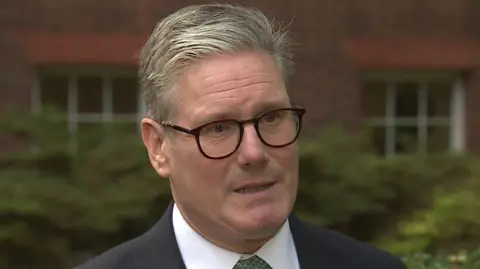[ad_1]
 BBC
BBCThe prime minister has insisted he is “completely in control” after the BBC revealed a row within government over staff pay.
It has emerged Sir Keir Starmer’s chief of staff, Sue Gray, received a pay rise which means she is now on a higher salary than him.
The story, briefed to the BBC by a number of sources, painted a picture of fractious relationships at the heart of government, less than three months after Labour’s general election victory.
Challenged by BBC South East political editor Charlotte Wright on a spate of off-the-record briefings about Ms Gray, the PM said: “I’m focused and every day the message from me to the team is exactly the same, which is we have to deliver.”
He added: “We were elected on a big mandate to deliver change. I am determined that we are going to do that.”
In interviews with other BBC regional political editors, Sir Keir defended his decision to accept corporate hospitality from Arsenal football club, saying he could no longer use his season ticket as prime minister.
The Premier League club has made two seats available to the prime minister in the corporate area of Emirates Stadium.
He said he had been advised it would cost the taxpayer more in security costs to use his normal seat.
He would “rather be in the stands”, but accepting a corporate ticket was a “perfectly sensible arrangement”, he added.
‘Permanent frustration’
On Wednesday, the BBC revealed it had been told that Ms Gray asked for and was given a salary of £170,000 after July’s election – about £3,000 more than the PM and more than her Conservative predecessor, Rishi Sunak’s chief of staff.
One source told the BBC: “It was suggested that she might want to go for a few thousand pounds less than the prime minister to avoid this very story. She declined.”
But others in government have spoken passionately in Ms Gray’s defence, and believe there is a misplaced, grossly unfair and deeply personal campaign against her.
Her salary has proved particularly controversial partly because other advisers believe they are being underpaid.
Most were expecting pay rises when they entered government, only to discover they would be paid less.
Many of the disappointed advisers blame Ms Gray specifically – although others insist pay is a matter for civil servants.
Business Secretary Jonathan Reynolds dismissed suggestions the prime minister had personally intervened to increase Ms Gray’s salary, saying ministers had “no input” in what their advisers were paid.
“There’s a process that exists, it’s a civil service process, it hasn’t changed. It’s wrong to say there’s any kind of political input in there or people set their own pay bands.
“I don’t even get to set the pay for my own advisers… I think there are and always have been officials who are paid more than politicians in our system and that hasn’t changed,” he told BBC Breakfast.
Mr Reynolds acknowledged that leaks about issues in government such as Ms Gray’s pay were “annoying” and “a permanent frustration”.
He also told Sky News that Ms Gray was “getting on with the job of this government, delivering on our promises. I think that’s what matters more than anything else for anyone who works in Downing Street.”
Speaking on Wednesday, Health Secretary Wes Streeting told the BBC: “We’re very lucky to have Sue.”
The appointment of Ms Gray, a former senior civil servant whose report into Covid lockdown parties in Downing Street contributed to the downfall of then-Prime Minister Boris Johnson, to Sir Keir’s team last year was controversial.
In recent weeks, she has been the subject of a series of reports of mounting acrimony at the heart of the new government, involving Ms Gray, Labour’s director of political strategy Morgan McSweeney and Cabinet Secretary Simon Case.
Over the weekend, Sir Keir played down these stories, saying “most of them are wildly wrong”.
‘Winter fuel payments’
The Conservatives have asked whether the prime minister personally signed off Ms Gray’s new salary and an increase in the cap on the highest pay band.
They have also asked whether a special adviser remuneration committee still exists and if Ms Gray is a member, as well as what role she played in setting her own salary and changing pay bands.
Shadow Commons leader Chris Philp told the BBC: “The prime minister’s chief of staff is getting an enormous pay rise. At the same time this Labour government is slashing winter fuel payments for pensioners earning half the level of the minimum wage.
“It’s pay rises for Labour cronies and cuts for hard-pressed pensioners.”
Guto Harri, a former Downing Street director of communications under Boris Johnson, told BBC Radio 5 Live’s Matt Chorley that being paid more than your boss at No 10 was “basically a no-no”.
“If you accept a job at the heart of No 10, whatever you’re worth, whatever you’re earning before, it’s not a good look to ask for more than the prime minister,” he said.
[ad_2]
Source link




